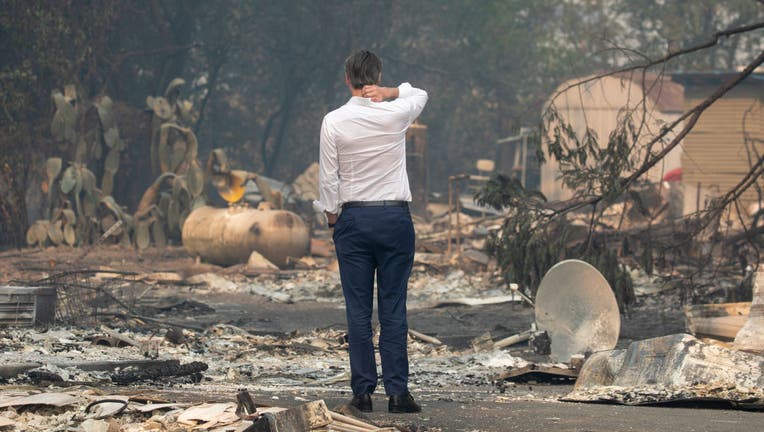California ban on fracking by 2024 criticized as too late

GEYSERVILLE, CA - OCT. 25: Gov. Gavin Newsom surveys a home destroyed in the Kincade Fire, Friday, Oct. 25, 2019, in Geyserville, Calif. (Karl Mondon/MediaNews Group/The Mercury News via Getty Images)
SACRAMENTO, Calif. - California Gov. Gavin Newsom moved Wednesday to end issuing new hydraulic fracturing permits by 2024, a delay criticized by many environmental groups but characterized as legally and politically realistic by another.
"He can suspend fracking now, but he is punting to the Legislature,” Consumer Watchdog advocate Liza Tucker said.
Kassie Siegel, director of the Center for Biological Diversity’s Climate Law Institute, was equally critical, saying that the governor “can’t claim climate leadership while handing out permits to oil companies to drill and frack."
Greenpeace USA's Caroline Henderson said Newsom's track record on fossil fuels “has only gotten worse,” while Food & Water Action California director Alexandra Nagy said his announcement amounts to “lofty words and predictions, but no meaningful action.”
The Democratic governor signed an executive order to stop sales of new gasoline-powered passenger cars and trucks by 2035 while also announcing that he will ask the Legislature next year to end new fracking permits by 2024.
The environmental groups say he also already has the legal authority to end fracking, which they say threatens water supplies and public health while allowing for the continued use of fossil fuels that lead to global warming.
The technique allows energy companies to extract oil and gas from shale rock deep underground by injecting high-pressure mixtures of water, sand or gravel and chemicals into rock.
Siegel's nonprofit conservation organization on Monday notified Newsom that it intends to sue his administration to stop what it says is the illegal permitting of 1,500 oil and gas wells just this year without the proper environmental reviews.
The group cited a ProPublica and Palm Springs Desert Sun investigation that found oil companies have reaped millions of dollars from selling the oil leaked from illegal spills with little punishment from state regulators they say are far too cozy with the petroleum industry.
California Independent Petroleum Association chief executive officer Rock Zierman meanwhile said the move will put thousands of people out of work, increase energy costs, and boost the use of foreign oil. The industry, he said, could help Newsom's climate goals by removing carbon from the atmosphere, resulting in negative emissions.
California Republican Party Chairwoman Jessica Millan Patterson also slammed the governor for endangering hundreds of thousands of high-paying oil and gas industry jobs.
Newsom defended his administration's regulation of the industry while insisting he can't end fracking permits unilaterally.
"We simply don’t have that authority. That's why we need the Legislature to approve it,” he said.
Newsom said less than 2% of the state's petroleum production comes from fracking. But he acknowledged that “it also is symbolic” and touted his phase-out deadline as “a bold and big step.”
He said other regulations are under review that could include the sort of oil-drilling buffer zones that environmental groups said Newsom should immediately impose around homes and schools. Newsom's executive order requires state agencies to come up with a plan by July to transition away from fossil fuels, a timetable that Consumer Watchdog’s Tucker called “a half loaf at best.”
And Newsom contended that his administration has “been very aggressive in terms of our enforcement” when it comes to oil spills, including “more aggressive oversight” and new leadership at the California Geologic Energy Management Division. But he ordered the regulators to strictly enforce cleanup rules for abandoned wells.
Newsom also argued that encouraging zero-emission vehicles to replace the internal combustion engine will create many new green jobs, promising “to make sure those that are impacted by this transition are included in the new economic opportunities.”
Sierra Club California director Kathryn Phillips said her organization is among those that believe the governor already has the authority to end fracking, but she acknowledged that Newsom's attorneys disagree.
If Newsom's lawyers are right, obtaining the authority from lawmakers in 2021 and phasing out fracking by 2024, “is probably about as fast as he can go.”
“On the one hand, it’s not fast enough. On the other hand, what he’s committed to is more than what any previous governor has committed to,” Phillips said. “This governor is now saying he’s going to work with the Legislature to get the power to ban fracking. That’s a good thing.”

